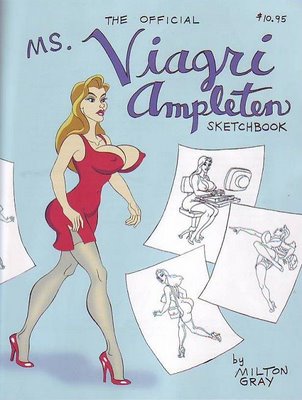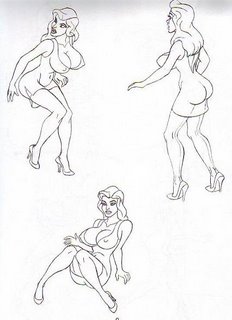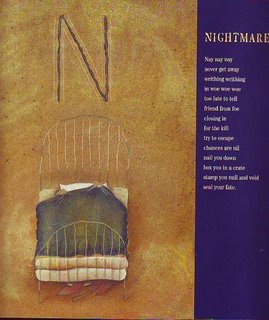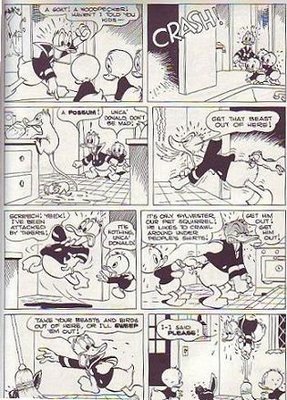
This is what I'm reading now: "Born to Kvetch" by Michael Wex. It's a book about Yiddish which has the distinction along with Jive of being one of the world's only deliberately funny languages. I've only just started it so I apologize in advance if I make any factual errors.
Yiddish is a deliberate corruption of German with a lot of slavic words thrown in. It's a relatively new language, only a few hundred years old. It began when German Jews decided to come up with their own version of German so their kids wouldn't be assimilated into what Jews considered an alien culture and religion. Yiddish isn't only different than German, it's a parody of it. It's also a parody of Christianity.
The language can get pretty insulting but the insults are so funny sometimes that it's hard to get mad about it. In that sense it's like Jive, the language that some urban American blacks speak. Jive isn't supposed to be understood by the white man. It's deliberately full of funny sexual and racial references that would put off white people, if they only understood it. It's a funny language that's meant to use humor to seperate black people from the mainstream. Jive is fast disappearing as is Yiddish. Now that Jews have Israel and blacks have their freedom the need for seperation is slowly disappearing. Israel officially discourages Yiddish, except for scholars who study it as an academic subject in the university.
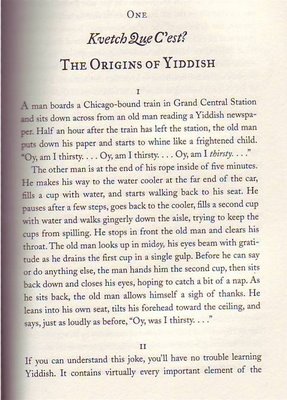
The title of the book mentions a Yiddish word, "kvetch." According to the writer all Yiddish speakers constantly complain (kvetch), whether there's anything to complain about or not. Yiddish-speaking Jews cultivated this to remind themselves that nothing will be right for them till they have a homeland of their own in Israel. The complaints are made tolerable by humor and it's no accident that Yiddish speakers helped to make America one of the funniest countries in the world. In Japan students of English sometimes study American jokes because it's believed that humorous speech is so widely used here that they'll be earmarked as foreigners if they don't make frequent jokes in the middle of a converstion.
I wish I had the energy to look up a few common Yiddish words to include here but I'm so sleepy that that I can barely finish typing this sentense. When I do learn some Yiddish words and phrases I want to move on to select Italian words and gestures. I also want to pick up some Jive. With all these funny linguistic treasures around us it seems foolish not to dabble.
 I have no idea how blogger will arrange the pictures I scanned in. Probably in the ugliest way possible. Oh well, nothing can dampen my enthusiasm for this post. I love talking about blonde bombshells. It was one of the greatest entertainment innovations of the 50s. It was not only good for busty actresses and scandal magazines but for popular literature, art, comedy, and the morale of the whole civilized world.
I have no idea how blogger will arrange the pictures I scanned in. Probably in the ugliest way possible. Oh well, nothing can dampen my enthusiasm for this post. I love talking about blonde bombshells. It was one of the greatest entertainment innovations of the 50s. It was not only good for busty actresses and scandal magazines but for popular literature, art, comedy, and the morale of the whole civilized world.


 She was already beautiful but she wanted more than beauty, she was looking for something funnier and more flambouyant
She was already beautiful but she wanted more than beauty, she was looking for something funnier and more flambouyant . She began by imitating Jean Harlow's look in "Dinner at Eight" then she slowly personalized the look. In the act of stylizing herself she helped to stylize the whole era she lived in. Charismatic, super-stylized characters like Marylin and Elvis provoke new structures in the media that portrays them, new kinds of stories, music, film making and acting. They're catalysts who stimulate everyone else's creativity. No wonder Arthur Miller fell in love with her.
. She began by imitating Jean Harlow's look in "Dinner at Eight" then she slowly personalized the look. In the act of stylizing herself she helped to stylize the whole era she lived in. Charismatic, super-stylized characters like Marylin and Elvis provoke new structures in the media that portrays them, new kinds of stories, music, film making and acting. They're catalysts who stimulate everyone else's creativity. No wonder Arthur Miller fell in love with her.

